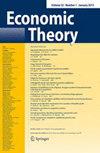讨价还价中的道德偏好
IF 1.1
3区 经济学
Q3 ECONOMICS
引用次数: 0
摘要
我们分析了双边讨价还价博弈(纳什,1953 年,《经济计量学》,21:128-140)的均衡。我们的研究表明,均衡集在很大程度上取决于这些道德偏好。此外,我们的静态比较分析还让我们深入了解了个人的道德关切和社会构成对分配的影响。将我们模型中的均衡集与自私偏好、康德均衡、公平偏好、利他偏好和厌恶不平等偏好下的均衡集进行比较,可以发现两者之间的重要差异。本文章由计算机程序翻译,如有差异,请以英文原文为准。
Moral preferences in bargaining
We analyze the equilibrium of a bilateral bargaining game (Nash, 1953, Econometrica, 21: 128–140). where at least one of the individuals has a preference for morality (homo moralis). We show that the equilibrium set crucially depends on these moral preferences. Furthermore, our comparative static analyses provide insights into the distributional implications of individuals’ moral concerns and the composition of society. A comparison of the set of equilibria in our model with those under selfish preferences, Kantian equilibrium, fairness preferences, altruistic preferences, and inequality averse preferences reveals important differences.
求助全文
通过发布文献求助,成功后即可免费获取论文全文。
去求助
来源期刊

Economic Theory
ECONOMICS-
CiteScore
2.50
自引率
23.10%
发文量
68
期刊介绍:
The purpose of Economic Theory is to provide an outlet for research - in all areas of economics based on rigorous theoretical reasoning, and
- on specific topics in mathematics which is motivated by the analysis of economic problems. Economic Theory''s scope encompasses - but is not limited to - the following fields. - classical and modern equilibrium theory
- cooperative and non-cooperative game theory
- macroeconomics
- social choice and welfare
- uncertainty and information, intertemporal economics (including dynamical systems)
- public economics
- international and developmental economics
- financial economics, money and banking
- industrial organization Economic Theory also publishes surveys if they clearly picture the basic ideas at work in some areas, the essential technical apparatus which is used and the central questions which remain open. The development of a productive dialectic between stylized facts and abstract formulations requires that economic relevance be at the forefront. Thus, correct, and innovative, mathematical analysis is not enough; it must be motivated by - and contribute to - the understanding of substantive economic problems.
Officially cited as: Econ Theory
 求助内容:
求助内容: 应助结果提醒方式:
应助结果提醒方式:


